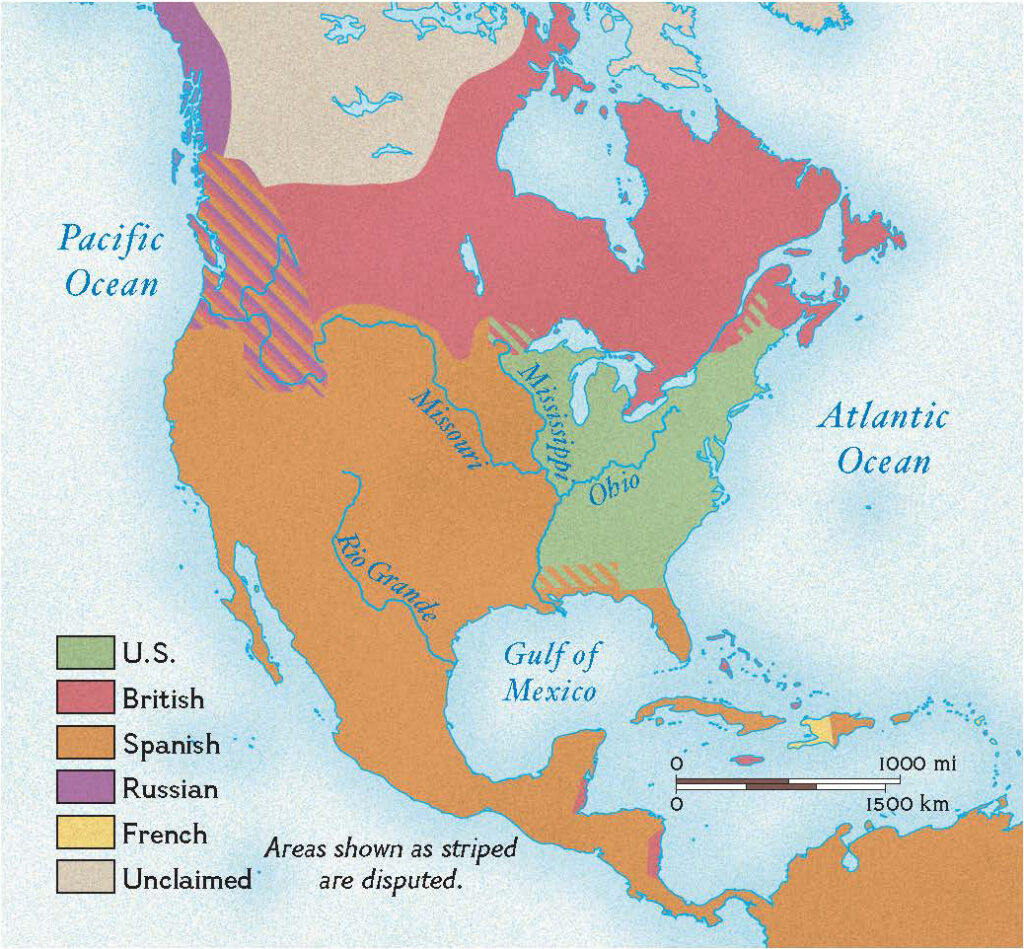Josep Colomer is a researcher and a former professor of political science at Georgetown University, Washington, DC. In his latest book, Constitutional Polarization: A Critical Review of the U.S. Political System, Colomer argues that the US constitution was designed with more “checks” than “balances.” In other words, it was designed to be dysfunctional.
An experiment in republican government
When Americans look back on their history, they tend to think — sometimes explicitly — that the framers of the constitution were divinely guided, producing a perfect document which was to endure for all time. Yet the truth is that framers were novices, and they did not have a solid conception of how the future republic would work. They had very few historical examples to go on.
Up until their time, republics had only governed cities, subnational entities or small nations like the Netherlands, Venice or Switzerland. Never before did a nation on the scale of the US adopt a republican constitution. At its inception, the US was already a nation of four million people (among whom 700,000 were slaves) with a land area four times the size of Great Britain.
Attempting something that had never been done before, the framers naturally made mistakes. Chief among these was the separation of powers. Following Montesquieu, they separated the executive from the legislature and divided the legislature into two chambers. Thus, they created a system full of veto points, where either the president or the Senate or the House of Representatives can stop legislation dead in its tracks.
The founders did not predict the emergence of the two-party system. At the time, formal parties did not exist. The founders expected that the best and most able men would be able to rise above party spirit and govern for the good of everyone. Yet a binary party system quickly arose, and it has dominated the US for the rest of its history. Most of the time, the president will find at least one of the chambers of Congress controlled by the opposite party. This means that deadlock typically rules the day.
With the hindsight of history, we now understand the minds of the framers better than the generation that ratified the constitution did. The delegates at the Constitutional Convention swore an oath of secrecy that was to last until their deaths. The reasoning that they published openly in writings like the Federalist Papers was not always the same as the reasoning they aired in the convention debates. In truth, the Federalist Papers neither describe what the framers intended to do or what they actually did.
The constitution was not an experiment in democracy, but an attempt to create a strong government that could unite the former colonies and resist the British Empire — with which the young nation still shared a continent. Thus, the framers created an extremely powerful president with war powers, a legislative veto and indefinite reelection, making him effectively an elected king. Alexander Hamilton even suggested giving the presidency legislative powers and toyed with the idea of making it hereditary.

The delegates were united in their wariness of democracy, which they viewed as a destabilizing and anarchic element. During the ratification debates in New York, James Madison warned that democracies “have ever been found spectacles of turbulence and contention … and as short in their lives as they have been violent in their deaths.” Hamilton wrote that democracies were dominated by people who “commence as demagogues and end being tyrants.”
Yet the United States had just fought a revolution against unjust taxation without representation, so the framers needed to allow some kind of popular representation in the federal government. Thus, they created the House of Representatives, whose members the people elected directly. But the democratic principle ended here. The Senate was an appointed body. (It would only become elected with the 17th Amendment in 1913). Likewise, the president was chosen by electors empowered by the states. Both the upper house and the executive, with its veto power, had the ability to block any initiative from the popularly elected lower house. Thus, the framers ensured that democracy could not take over the federal government.
The framers hoped to create a system that required gentlemanly deliberation and consensus-building. Yet the constitution was a first (or second) try, and they were aware that it would need to be revised and corrected with the experience of history. They were not able to predict how the operation of the government would turn out in practice. Neither did they predict how fiendishly difficult it would be to amend the constitution in light of its revealed flaws.
United in war, divided in peace
So, the framers installed a system that was riddled with divisions and veto points. It may have been effective at preventing the passage of bad laws, but it was not very effective at allowing the passage of good laws. Indeed, the system only works when Americans have a common purpose around which the different parties and branches of government can unite and coordinate their action. The British Empire was the common enemy that played that role for the founding generation. Indeed, the US would have to fight another war for its very existence against the British in 1812. The various political forces were more-or-less able to cooperate until the threat receded.
Then came the Jacksonian age, marked by increased political strife to the point of physical altercations on the house floor. Sectarian and regional divisions grew, and Americans learned to hate one another. It became impossible to build a political or cultural consensus, and this strife eventually culminated in the Civil War, which is to this day the bloodiest war in American history.
After the war, the victorious North was unable to pick up the pieces in a conclusive way. The project of reconstruction failed to reintegrate the fractured nation, and it continued to be divided until it faced a new external threat — fascism. In World War II, Americans put aside their differences for the cause of defeating fascism. After the war, they remained united in a common purpose to defeat communism in the Cold War. The political system, united to make war on external foes, rallied behind the president whose function it is to make war and to negotiate with foreign powers. Thus, it granted the president increasingly broad authority. Likewise, the population feared external threats and was more inclined to trust and cooperate with the government. Voters did not demand as much public scrutiny of politicians.
Yet the communist threat too receded. After the collapse of the Soviet Union, the mentality of the Cold War morphed into an internal cold war wherein the two parties began casting each other as ideological threats and existential enemies. The past 30 years have thus been another period of low external threat and high internal conflict and, thus, political dysfunction. These days, we can hardly pass a budget without destructive political wrangling and brinksmanship.
America is only functional and free from domestic strife when it has an enemy to fight. When it does not, the divisions inherent in the system come out, and the nation descends into polarization, infighting and dysfunction.
A system built to fail
Some analysts would blame polarization right-wing populists who stir up anger and mistrust. But every large nation has some of those. What makes America different are its divided institutions that make it uniquely susceptible to this kind of politics.
In Germany, for example, there are nationalists, but they are largely sidelined by a majoritarian parliamentary system that encourages more consensus-building in the center than a binary divide. In the American system, there are only two options. In both local and national elections, people can merely vote for the lesser evil candidate, who thus wins a large mandate and has litte incentive to compromise.
To make matters worse, since the two candidates are chosen by primary voters who tend to be the most motivated and ideological voters in a party, the candidates skew even farther towards the extremes and away from the center. The result is that candidates fail to represent what most Americans actually want. This, too, is a privation of democratic governance.
Eventually, people will lose patience with an ineffective system that cannot provide solutions to the problems they have. They will turn away from divided legislatures to the only actor that can act unilaterally, which is the presidency. Thus, the president concentrates power and rules by executive order. In this way, too, the system fails to be democratic.
Something has to change. Yet the only mechanism for changing the constitution itself — the amendment process — is itself riddled with veto points, and it is almost impossible to actually use. But all hope is not lost. There are some methods that we could implement now without needing to pass an amendment.
First, we can reform electoral practices. Right now, some local and state governments are experimenting new voting methods, such as approval voting or ranked choice voting, which would be more open to numerous candidates and promote the formation of a consensus around the winner instead of an adversarial relationship. These experiments may become more widely imitated in the future.
Second, we need a more cooperative relationship between the president and Congress. One seldom-talked-about aspect of the constitution is that the vice president is also the president of the Senate. Thus, the vice president is a figure that can function as a liaison between the legislature and the executive, smoothing processes and helping to build agreement.
Third, the US should draw upon the resources of its federal structure. Not every conflict needs to be resolved in an all-or-nothing manner on the federal level. A greater degree of decentralization, which allows different jurisdictions to try different things and for deliberation to happen closest to those affected by it, could go a long way in diffusing the conflicts and polarization that bedevil federal politics today.
[Anton Schauble wrote the first draft of this piece.]
The views expressed in this article/podcast are the author’s own and do not necessarily reflect Fair Observer’s editorial policy.













Comment